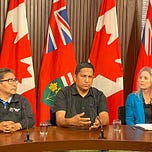Grassy Narrows Press Conference L to R: Grassy Narrows Chief Rudy Turtle; Mike Fobister, Supervisor of the Grassy Narrows Lands Protection Team; Grassy Narrows lawyer Jackie Esmonde Credit: Jackie Esmonde
On July 12, 2024, Grassy Narrows First Nation launched a legal application asking the court to declare Ontario’s Bill 71, Building More Mines Act (2023) unconstitutional and without force or effect in Grassy Narrows' area.
If successful, the action could require Ontario to rescind thousands of existing mining claims that have been staked on Grassy Narrows lands without consultation and against Grassy Narrows’ will.
"My people have suffered far too much from industry that has been forced on our land with devastating impacts to our health and way of life,” said Chief Rudy Turtle of Grassy Narrows at a July 12, 2024 press conference held at Queen’s Park.
“We want to heal the land so that we can heal our people and restore our culture and wellbeing. Rather than listen to us, Ontario has granted thousands of mining claims on our land behind our backs. We only find out after the claims have been granted and after Ontario has given strangers a green light to carve up the land that we cherish and rely on.”
Under Ontario’s free entry mining regime anyone can become a prospector by paying a $25 fee and taking a one-hour online course.
Prospectors can then stake claims online and do invasive assessment work on the claims without any consultation whatsoever, and without Grassy Narrows' free, prior and informed consent.
Grassy Narrows is notified about the claims only after they have been granted and the claim holder has gained the right under Ontario law to own and extract any valuable minerals.
The assessment work allowed by the Mining Act includes building heavy machinery trails, clearing trees, cutting extensive lines, digging pits and trenches, and stripping all vegetation and soil off the bedrock. All of this work can be performed without consultation with, nor consent from, Grassy Narrows First Nation.
This violates s.35 of the Constitution Act, which requires meaningful consultation and accommodation before activities that could impact Grassy Narrows' rights take place.
It also violates the United Nations (UN) Declaration on the Rights of Indigenous Peoples (UNDRIP) which requires free, prior, and informed consent before industry encroaches on their traditional lands.
“Grassy Narrows has tried for decades to protect its environment and people from further harm,” said Jackie Esmonde, Grassy Narrows legal counsel.
“Ontario has refused to even talk to Grassy Narrows about their concerns with the free-entry mining regime and how it compounds the harm that mercury poison, clearcut logging, and hydro dams have already caused to Grassy Narrows’ wellbeing and way of life. We are asking the court to order Ontario to act honourably and to stop violating Grassy Narrows’ constitutional rights,” Esmonde added.
A staggering 93% of the Grassy Narrows area is subject to free entry mining and open to mining exploration and mining under the Ford government’s Bill 71, Building More Mines Act (2023).
Grassy Narrows Chief Rudy Turtle with map showing the area around Grassy Narrows that is open for mining identified in the pink – 93% of the area around Grassy Narrows Credit: Jackie Esmonde
There are currently 10,168 mining claims in the Grassy Narrows area, with more than 5,000 staked online since 2018. Together with other mining tenures, the claims cover an area 4.5 times the size of the City of Toronto or roughly 30 per cent of the Grassy Narrows’ area.
It’s important to remember that the lands these settler prospectors are staking have been home to Grassy Narrows people for countless generations and continue to provide the sources of life, culture, and livelihood.
It’s also essential to remember the detrimental impacts colonization has had on the people, land and waters of Grassy Narrows. The Wabigoon River and surrounding rivers and lakes were contaminated with mercury throughout the 1960s and 70s when the Dryden paper mill released over 10 tonnes (11 tons) of mercury into the Wabigoon River.
Clear cutting in the area continues to contaminate the Wabigoon with mercury.
And, as recently as May 2024, University of Western Ontario scientist and mercury expert, Dr. Brian Branfireun, concluded the ongoing discharge of pollutants in industrial wastewater from the Dryden paper mill into the Wabigoon River significantly contributes to elevated levels of methylmercury – the most toxic form of mercury – in sediments, water, and ultimately, fish.
Sulphate continues to be discharged into the Wabigoon from mining processes as well as pulp and paper mills. These sulphates combine with mercury to form methylmercury. The Ontario government does not regulate sulphate discharge nor has it cleaned up the mercury dumped into the Wabigoon by the Dryden mill in the 1960s and 1970s.
Branfireun shared his report, Riverbank Mercury Methylation Study, with the Ontario government, the mill owners, English and Wabigoon River First Nations and the public because as he says, “These results are shocking, but not unexpected because existing science has pointed to this for decades.”
Branfireun added, “We have the scientific knowledge that is needed to reduce fish mercury levels in the Wabigoon River. I hope that this information will be taken very seriously.”
Japanese researchers released their own report, Canada’s Indigenous Grassy Narrows Nation Suffers Mercury Poisoning: Half a Century Later, in 2023. The researchers diagnosed the Ojibwe First Nation with Minamata disease, a neurological disorder caused by consuming fish contaminated with methylmercury.
For decades, Grassy Narrows residents have suffered the debilitating effects of mercury poisoning including miscarriages, birth defects, renal failure, hearing loss, memory loss and a suicide rate 20 times the national average.
Since there is no cure for mercury poisoning the only recourse is limiting exposure and that’s impossible when the contamination is not only ongoing, but is increasing exponentially due to unregulated sulphate discharge.
In a time when Canadians and their governments are supposed to be working towards reconciliation and restitution, the Ford government’s decision to advance an antiquated mining act while refusing talks with Grassy Narrows First Nations representatives is not only ill conceived, but runs contrary to his infamous ‘common sense’ approach because this one is a no-brainer — stop stealing land that is not yours, stop discharging sulphate into the Wabigoon — because poisoning an entire Nation and essential water system should never be part of any business plan and start talking about meaningful remediation to clean up the Wabigoon River.
This case calls into question the validity of nearly all existing mining claims in Ontario as well as the system for staking new claims because the rights of Indigenous Peoples under s.35 of the Constitution Act and international law apply across the province.
“This old law is outdated, unconstitutional, and offensive. The mining act takes us in the opposite direction of reconciliation and healing, and forces more grief and conflict on my people whose burden is already too great. I will not stand for this, and I hope that the courts will see that justice is done here for Grassy Narrows and for all First Nations," said Chief Turtle.
Join me today as I speak with Jackie Esmonde, partner with Cavalluzzo Legal Services.
Jackie practices in the areas of Labour, Constitutional, Public Law and Indigenous Rights. She has litigated at all levels of court in Ontario, the Federal Courts and the Supreme Court of Canada. She has also appeared before many administrative tribunals.
Jackie is currently working on two lawsuits for the Grassy Narrows First Nation. One filed against both the provincial and federal governments for violating Grassy Narrows’ Treaty rights by failing to protect against and remedy the effects of mercury and other industrial contamination.
The second case – the one we will be focusing on today — is the legal application that Grassy Narrows First Nation launched on July 12, 2024 asking the Superior Court of Ontario to declare Ontario’s Mining Act unconstitutional and without force or effect within the Grassy Narrows’ area.
Thanks to everyone who read today’s article and listened to my podcast. With your continued support, a little Nicoll can make a lot of change.
Music: Real Estate by UNIVERSFIELD is licensed under a Attribution 4.0 International License. freemusicarchive.org.
*Be sure to download the Substack app to get the most from your podcast experience.














Share this post